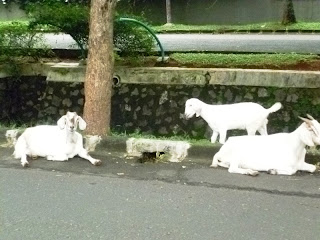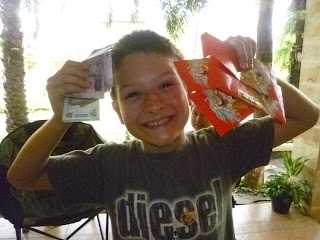Though many people consider Jakarta’s traffic a necessary evil, people like Martini look forward to their daily commute. For the past 13 years, Martini has made a living helping drivers meet the city’s ‘three-in-one’ rule that requires private vehicles to have at least three people to access some major roads during rush hour.
As a joki, or jockey, every morning and afternoon Martini heads to the Plaza Semanggi area and helps office workers to work or home by hopping a ride with them. The job is illegal and Martini has been arrested twice, but she insists the three-in-one jockeys are providing a valuable service, not disturbing public order. In any case, the former maid has no intention
of leaving her post, unless it’s to hasten someone’s commute while making some small talk along the way.
How much do you get paid for being a three-in-one jockey?
I get Rp 10,000 [$1.10] to ride from Plaza Semanggi to Ratu Plaza and Rp 20,000 if the driver wants me to stay until Blok M. Sometimes I also go back from Blok M to Monas [the National Monument] for another Rp 20,000. You actually get paid for having a free ride around Jakarta.
How many rides do you take in a day and how much do you earn?
I arrive early at my station around the Semanggi area on Jalan Prof. Dr. Satrio, or as people call it, Casablanca. In the early three-in-one round, between 7 a.m. and 10 a.m., I can get two cars at most. Later, during my afternoon round from 5 p.m. to 9 p.m., I can get up to four drivers in need of my service. So on average I usually make Rp 40,000 to Rp 80,000 a day. Definitely not a bad way to earn extra cash for my family.
Is this the only job you have?
Yes. I need the extra money for my family. I have three children and my previous job as a maid wasn’t able to put enough food on the table. So when my younger sister asked me to join her out here doing this in 1999, me and my husband definitely jumped at the opportunity with no hesitation.
You know that working as a three-in-one jockey is illegal, right? Have you been arrested?
Sure, I got arrested twice last year by public order officers. They said I was violating local laws and was therefore disturbing public order. They made a record of my identity and took me to a shelter and locked me in there for the whole day.
I felt lucky because I heard another jockey got locked up there for a week, maybe because he had been arrested a number of times before.
On one memorable occasion, a traffic police officer stopped the car I was in. The officer asked the driver to open the side window and told me to get out. He threatened to turn me over to the public order officers if I didn’t admit that I was a jockey. I was afraid so I admitted it and the officer let me go while the driver got a ticket.
Knowing the consequences, why you still do it?
I know that my job is illegal, but I have never understood why the government thinks that we disturb public order. Drivers need us to use the major streets after work. Without us, lots of drivers would have to take long detours to get home, and that’s before even mentioning the traffic. Besides, the money I get from being a jockey helps my family survive in Jakarta, and is better than the other jobs that people like me usually do. We never chose to be poor, and the government hasn’t done anything to help us survive or make our lives better. So we take any opportunity that presents itself.
It seems like you have met lots of different kinds of people in your line of work. Have you ever met any ‘naughty’ drivers?
I haven’t met anyone who’s done anything indecent. Most of them are office workers who drive alone. Many of them like to make small talk with me. They ask me where I live and how many kids I have. One or two have even shared with me problems they are having with their work or family. But there are times when it’s just quiet in the car.
Do you ever get a good tip for just being nice to a driver?
Some nice drivers have paid me more than the usual rate. Others sometimes pay more because they’ve just gotten a big bonus or promotion at work.
Martini was talking to Carlos Situmeang.
http://www.thejakartaglobe.com/myjakarta/my-jakarta-martini-three-in-one-jockey/491081



